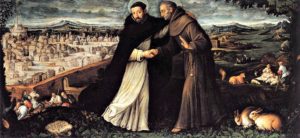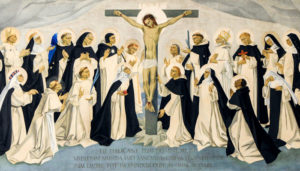
The major religious orders of the first millennium of the Church were monastics. They sought stability outside the false order of the city. Hence, they did not live in cities. But mendicant orders did. They sought to transform the order of the city into the order of Christ, something they witnessed to in radical poverty and preaching. Instead of leaving the City of Man to itself, they would bring the City of God to the City of Man, transforming it from within.
My wife and I were recently in Krakow. At the heart of the city are the Dominicans and the Franciscans (two mendicant orders), which is fitting because the city was founded around the rise of the Mendicant Orders. Maybe that is why the city seems to be alive with Christ. The orders were there to help guide the development of the city. A city is like an organism. It informs its many parts. Its laws, customs, and beliefs lead individuals to the way of life or the way of death. Today we are so accustomed to thinking of ourselves as atomic individuals artificially brought under the influence of the city and its ways. However, this was not so to the medieval mind. For them, everything was interconnected within a natural hierarchy. Some things took precedence to others just as, using an organic analogy, the heart is more important than the limbs. For them, the beliefs of the city were very important, for at issue was its salvation (life) or damnation (death). The spread of heresy within a city was like the spread of a disease. Experts needed to be brought in to help with a cure. The Dominicans answered such a need.

When St. Dominic came to Toulouse in Southern France he was amazed and saddened by the spread of the Albigensian heresy. The lavish lives of the Catholic preachers offended many people, prompting them to turn to the austere heretics. This experience prompted St. Dominic to found the Order of Preachers (Dominicans) who would live austere lives yet preach true Orthodoxy. They would combat heresy with great learning. This was not for the sake of superiority and dominance but the truth. Life lived in the truth is always better than life based on a lie. On this Feast of St. Dominic, let us pray for zealous, well-informed religious who can preach and witness to the Gospel in the heart of the city. The conversion of a city may just happen to begin from the houses of the mendicants like the Dominicans. Theologian C.C. Pecknold agrees. He wrote a great little piece in First Things on what he calls the “Dominican Option”, an alternative to the popular “Benedict Option.” Here is a part of his piece:
Better to speak of the Dominican Option. When I see them in the white habits at prayer, or giving lectures, or playing guitars and banjos on the subway, I have a plausible image of a “contrast society” that is very much engaged with the world—an evangelistic witness which is joyful, intellectually serious, expansive, and charitable.
St. Dominic founded the Order of Preachers after a long contemplative season which, in the words of one biographer “burst into flame” when he encountered Albigensians (ancient Manichean dualists) on travels through southern France. Dominic stayed up all night arguing with one Albigensian, and by morning the man turned away from his heresy and turned towards the Catholic faith. Dominic’s missionary zeal flowed directly out of cloistered contemplation, but it convinced him of the need for a new evangelistic order.
Dominic told his men to go into the world without fear. They should study, they should pray, and they should preach. His Order harmonized the life of a contemplative with the activity of an evangelist. This meant intellectual training. One only needs to think of St. Thomas Aquinas at the University of Paris to understand the impact this had. Dominicans studied other languages, and other religions, in order to preach more effectively. Aquinas himself wrote the Summa Contra Gentiles precisely to assist the brothers’ preaching to Muslims.
This is what we need today as well: the right pattern of formation and evangelistic witness. Not every Christian will be a Dominican, of course. But we all have something fundamental to learn from the Dominican pattern of life.